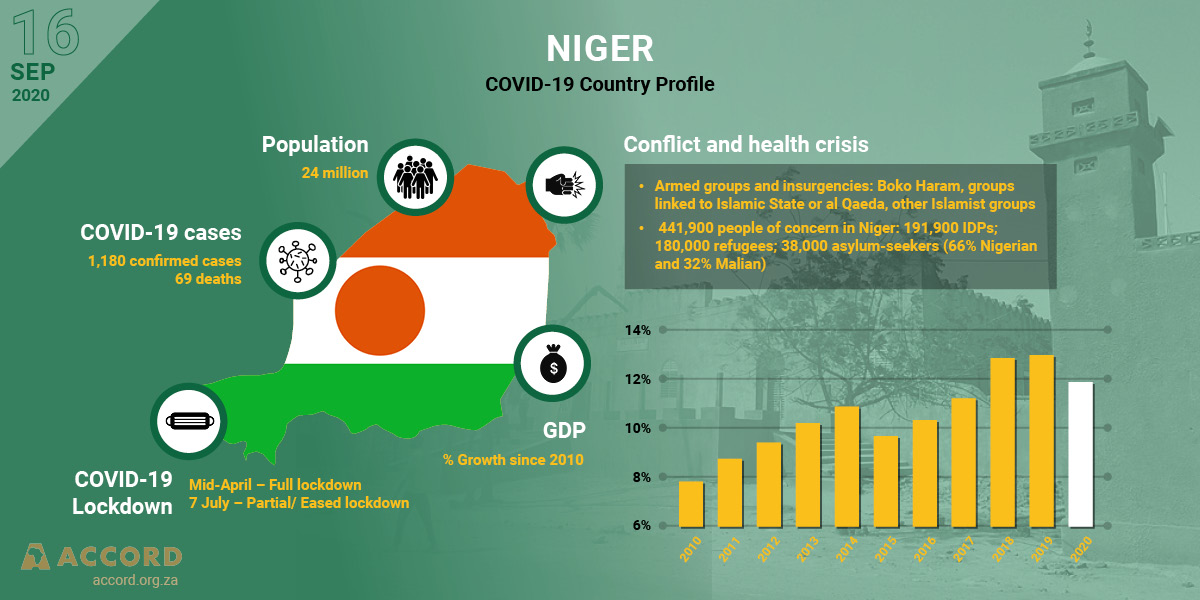Despite the active involvement of national and foreign armed forces, the security situation in Niger remains very volatile. The attacks perpetrated by armed groups are intensifying, targeting the strategic positions of the defence and security forces with occasional very heavy casualties. Civilian populations are also victims of the abuses and violence of these armed groups, as they sometimes witness the execution of their leaders, are forced into the compulsory payment of a tax on livestock or to access natural resources, or are exhorted to evacuate their places of residence.
Over and above the security challenge, Niger has the highest demographic growth rate in the world (3.9%). Furthermore, poverty and the consequences of climate change on ecosystems and on the living conditions of populations complicate the situation. All these factors increase the vulnerability of the population and reduce their capacity to deal with the disturbances induced by conflicts and climate change. This is especially pertinent since these are communities whose main economic and livelihood activities – agriculture, livestock and fishing – are sensitive to climate change, recurrent disasters and the degradation of natural resources. There is sometimes also rivalry between farmers and herders for access to land, water and pastures. This is often a source of intercommunity conflicts and takes place outside the established rules.
In addition to this, there is now the added threat of the COVID-19 pandemic, for which Niger took unusually drastic measures even before the recording of its first two cases on 20 March 2020.
There are several structural constraints that weigh on the resilience of communities. These are varied, but include the following:
- Due to the acceleration of climate change in recent years, there has been a high interannual variability in rainfall with a global trend towards an increase in rainfall, leading to flooding. These floods destroy people’s means of existence, especially since their capacity to cope with these disaster situations remains weak. Local climatic hazards associated with unsustainable resource exploitation practices by a growing population have resulted in additional environmental pressure, which has put a strain on existing structural constraints.
- The weak presence of the state, combined with a low rate of development in these areas, has led to growing popular discontent with the authorities. Poor governance has been a factor of conflict. Sometimes, the traditional governance mechanisms in these areas have proven to be more suited to promoting local conflict resolution than the judicial system, which is far removed from the local population.
- Demographic growth remains high, with a national rate of 3.9%. This rapid rate of population growth in the region will require significant investments in basic social services, including health, education and, in particular, youth employment.
- Abuses by armed groups and armed conflicts – the effects of which add to the structural constraints described above – have caused massive displacement, the disruption of markets and social systems, and the deterioration of the region’s economy.
- Internally displaced persons (IDPs) and refugees generally live in host communities. These communities often lack adequate absorption capacity in terms of livelihoods and social services to meet the needs of new arrivals, which has significant environmental and economic repercussions.
- Essential social services and governance systems have been disrupted, including by COVID-19, and many local and traditional governance structures have been challenged by the consequent deployment of military personnel. The ongoing conflict between armed groups and security forces has also had a considerable impact on the already limited provision of basic social services due to the deliberate targeting and destruction of infrastructure and facilities, and the departure of civil servants in the face of the deteriorating security situation. The armed groups also target schools, thereby depriving several thousand children of access to education.
COVID-19 impacts
In Niger, the first COVID-19 cases were recorded on 20 March 2020, but before that date the authorities at the highest level took drastic and unusual measures, including the closure of borders and schools and limited access to places of worship, among others.
Combating this virus is a particularly difficult task in a country where the social and economic conditions of the population are already precarious, due to unequal access to health services for vulnerable populations. The weight of the conflicts in the Tillabéri and Diffa regions, the socio-economic impact and the response put in place by the authorities are all factors that aggravate existing conflicts. It is essential to fully understand the factors of resilience of communities while keeping in mind that the pandemic, as well as the measures introduced to prevent the spread of the virus, will disproportionately affect those whom are already vulnerable or marginalised – in particular, displaced people, refugees and the communities that host them, nomadic or pastoral populations and minorities.
Laouali Mahamane is a geographer by profession, director of the Bureau d’Etudes Beta Consult and the focal point of the Alliance for Rebuilding Governance in Africa (ARGA) in Niger. He is working in the implementation of various research projects – PREVEX (Preventing Violent Extremism in the Balkans and the MENA: strengthening resilience in enabling environments), FRAGVENT (Fragile states and violent entrepreneurs: conflict, climate, refugees) and JIGOV-Sahel (analysing jihadist insurgent governance in Mali, Burkina Faso, Niger and Nigeria) – in partnership with ARGA and the Norwegian Institute of International Affairs (NUPI).

